- Ashish Chadha aka Ashish Avikunthak
This posting was inspired by two birthdays –mine and Ashish Chadha’s. Ashish, who just turned 40, is an experimental filmmaker known as Ashish Avikunthak. His wife Ashwini Deo teaches Linguistics at Yale, and so Ashish was a trailing spouse for a few years and taught courses at Yale on South Asian cinema. Our families began to spend time together–mostly potluck dinners, and then Ashish and I suddenly found ourselves co-teaching Documentary Film Workshop in 2009-10 and becoming fast friends. The experience helped him get a full-time job teaching filmmaking and film studies at University of Rhode Island (Ashish also has a Ph.D. in Anthropology from Stanford), while it prepared me for my return to teaching filmmaking after a hiatus of roughly ten years.
 When my birthday popped up this year, students in the current iteration of Documentary Film Workshop gave me a birthday card–and I have to say it was not just my favorite card, it was my favorite present. So I wanted to share it with you.
When my birthday popped up this year, students in the current iteration of Documentary Film Workshop gave me a birthday card–and I have to say it was not just my favorite card, it was my favorite present. So I wanted to share it with you.
By now I am all too ready to gloss over my birthdays. I have many more in my past than there will be in the future. But this card got me thinking about the ways in which the classroom––particularly this classroom––can (and has) become a community and a source of sustenance for all of us. The fact that Documentary Film Workshop is a year-long course obviously helps. So too that each student comes into the class with a fairly well defined project–often well under way. But the kind(s) of students who find their way into the course is also important.
Teaching Documentary Film Workshop is a wonderful privilege. Our class has roughly twelve members––half are graduate students and half are undergrads (all seniors with one exception). Class meets on Tuesday evenings (for screenings) and Wednesday afternoons at Yale’s Digital Media Center for the Arts:
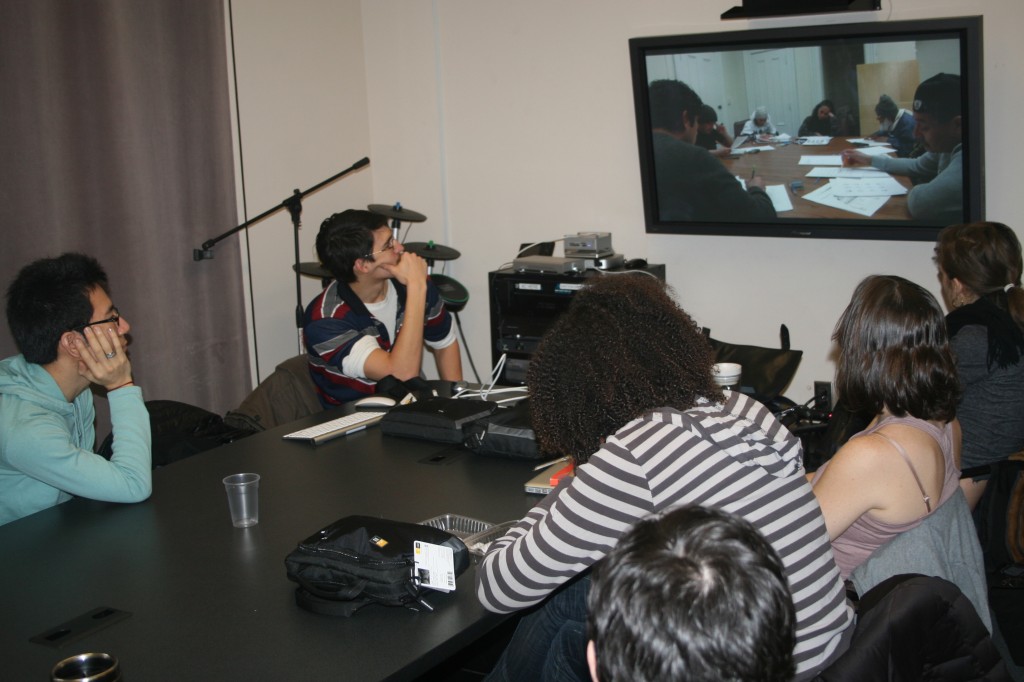 A few of the students were off filming on the day I snapped these photos, but here we are watching some scenes from Steve Garza’s work in progress, which looks at the lives of a group of New Haven residents who are taking ESL (English-as-a-Second-Language) classes at Yale’s Casa Cultural Latino.
A few of the students were off filming on the day I snapped these photos, but here we are watching some scenes from Steve Garza’s work in progress, which looks at the lives of a group of New Haven residents who are taking ESL (English-as-a-Second-Language) classes at Yale’s Casa Cultural Latino.
Yelin Qiu is making a feature-length essayist documentary on the rural-urban tension in contemporary China, tentatively entitled The Way Home. He shot most of his footage in China over the summer. By a piece of good fortune we held our preliminary meeting for his project in May, when we were both in Paris. I was on my way to a conference in Lausanne while he was spending his junior year studying at L’Université Paris Diderot et CPEC (Centre Parisien d’Etudes Critiques). While talking about his project, I walked him over to rue Daguèrre and we knocked on Agnes Varda’s door. By chance he’d met her the night before at a screening of Les glaneurs et la glaneuse–and I wondered if he might find a small place for her in his film. She wasn’t home, and a few days later he left for Bejing. On this particular day, Yelin showed us a wonderful scene of a family making charcoal in rural China..
Naima Sakande, a Sophomore, videotaped more than a dozen interviews with residents of a Cambodian village this past summer as part of the Khmer Legacies Project organized by Socheata Poeuv, director of the documentary New Year Baby (2006). While the interviews focused on the genocide under Pol Pot, Naima’s subjects also offered up a larger history of the village. She has been getting the material translated and is planning to offer us a historical portrait of the village.
Patrick Reagan is a Film Studies/German Ph.D. student making a documentary about community gardening in several different parts of the United States. He has a collaborator, Drew Paonessa, who lives in Los Angeles. The filmmakers often shoot independently on opposite coasts but have met mid-continent a couple of times: in Detroit, where they interviewed Grace Lee Boggs, and in Chicago, where they interviewed Bill Ayers. In a loose way, Patrick’s documentary is related to his dissertation project on utopia and distopia in contemporary European cinema.
Danielle Tomson is working on a documentary about radical Islam in Kosovo, where she had been filming over the past summer. As with Naima, one of her biggest logistical challenges involves translation. Tory Jeffay is making a documentary about scrapbooking–a little-examined subculture of women. She showed some highlights to a group of Mellon fellows soon after our class meeting: it is going to be a very engaging film.
Takuya Tsunoda is a Ph.D. student in the combined East Asian Language & Literatures/Film Studies program. He is writing a dissertation on Iwanami Productions and was hoping to make a documentary about one of its directors (HANI Susumu) but was disuaded when it appeared that he would not get back to Japan until the summer of 2012. Instead he is working on a documentary about MORI Tatsuya, the controversial documentarian who recently finished a feature-length video entitled 311–on the earthquake and tsunami that hit Japan on March 11, 2011. Mori was expected to come to Yale to show his film but had to cancel at the last moment. He provided a Q & A via Skype after the screening, which Takuya filmed instead. Takuya’s documentary is becoming one of those classics in which the filmmaker is chasing after his always elusive subject.
The class met again and several of the absent ones were back. So I broke out my camera again.
For her senior project, American Studies major Rachel LaViola is making a documentary about the inadequate support system that Texas provides children with autism–-specifically in the public schools. As is often the case with such projects, there is a strong autobiographical component: her brother Zach has autism. As with other families in this situation, it has had a profound impact on every aspect of their daily lives. Rachel shot hours of footage over the past summer and has repeatedly return to Texas to film during the school year. Her confidence and abilities as a cinematographer have become steadily more impressive. Rachel’s initial idea was to present a number of case studies, with her family being one of them. When she showed us footage, her brother Zach proved to be a very sympathetic figure despite his many challenges. When Rachel played a recording of Zach singing “Somewhere Over the Rainbow,” we were in tears and knew that she had found her subject.
When looking for ways to be helpful, I talked to NYU’s Faye Ginsburg, a friend and former colleague who has become an expert on documentaries dealing with disabilities as a result of her own daughter’s illness. Faye told me there is a whole subgenre of documentaries on autism which have been made by family members. I got the Film Study Center to purchase some of them so Rachel could become familiar with the genre in which she was operating. Indeed, each week in the fall semester our class looks at a documentary related to one student’s work, and upon Rachel’s request we screened Beautiful Son (2007), which Hawaiian filmmakers Don and Julianne King had made about their autistic son. This moving film made clear that the documentary focusing on a cute young boy with autism had already been done and it pushed Rachel to move beyond that idea (and pushed her fellow classmates to offer suggestions from a new and broader perspective). Rachel’s mother Mara LaViola, could not have agreed more. As a Special Education Child Advocate, she frequently represents families with autistic children as they seek resources from local and state governments. She was frustrated/disappointed/angered by our earlier advice to Rachel (ie to focus on her sympathetic brother to the exclusion of those who were less photogenic and yet often face even more severe problems). Another student in the class has a brother with autism. So we are all learning more about this increasingly common condition through Rachel’s project.
Lauren Tilton is a Ph.D. student in American Studies and her documentary fulfills requirements for the MA in Public Humanities, now being offered by Yale’s American Studies Program. Her documentary comes out of an innovative engagement with the Farm Security Administration and Office of War Information photographs that are archived at the Library of Congress. Working with several colleagues, she has come up with a web-based program that will enabled users to see the sequence of images as they were taken by individual photographers. Through funding from the NEH, Lauren is now implementing this transformation of the ways in which the archive can be used. Her documentary is an independent but relatd project about the FSA/OWI archive and some of the insights into the collection that her new approach allows.
Chandra Simon, a MA student in the school of Forestry and Environmental Studies, joined the class this spring. She is a veteran producer who was director of the Environmental Film Festival at Yale for 2011. As she explained in an email, her documentary project is “constantly evolving and changing in scope and format but basically I’m profiling farmers and activists who are trying to create a more sustainable and healthy food system.”
No effort to explain the essentials of Documentary Film Workshop would be complete without acknowledging the critical role played by the DMCA (Digital Media Center for the Arts), its Associate Director Lee Faulkner and Technical Specialist Anna Loar. Without them, nothing would be possible. In a world where everyone has to be evaluated and ranked from 1 (poor) to 10 (outstanding), they both rate a 12, which is reserved for real-life super heroes. Why? The energy at the DMCA is very special. Lee is my unofficial co-teacher, training students on cameras, Final Cut Pro and microphones. Anna, who runs her share of workshops and provides crucial support to all of us, is a singer and musician in her other life. She’s a major recording artist just waiting to be discovered.
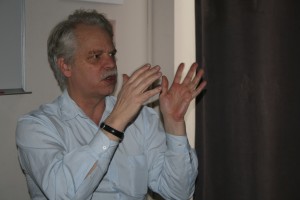 There is that always important moment when the subjects (“my students”) refuse to be passive objects of my authoritarian gaze. (In different ways it happens all the time!) When I put down the camera in order to make a point, Yelin took control and began shooting. His snapshots made me realize that mine had tended to be portraits of students watching or listening. Certainly this is not the representative of our classroom dynamic but rather reflects my limits as a photographer. Yelin took some other shots: here is one of Naima–just to offer some visual evidence.
There is that always important moment when the subjects (“my students”) refuse to be passive objects of my authoritarian gaze. (In different ways it happens all the time!) When I put down the camera in order to make a point, Yelin took control and began shooting. His snapshots made me realize that mine had tended to be portraits of students watching or listening. Certainly this is not the representative of our classroom dynamic but rather reflects my limits as a photographer. Yelin took some other shots: here is one of Naima–just to offer some visual evidence.
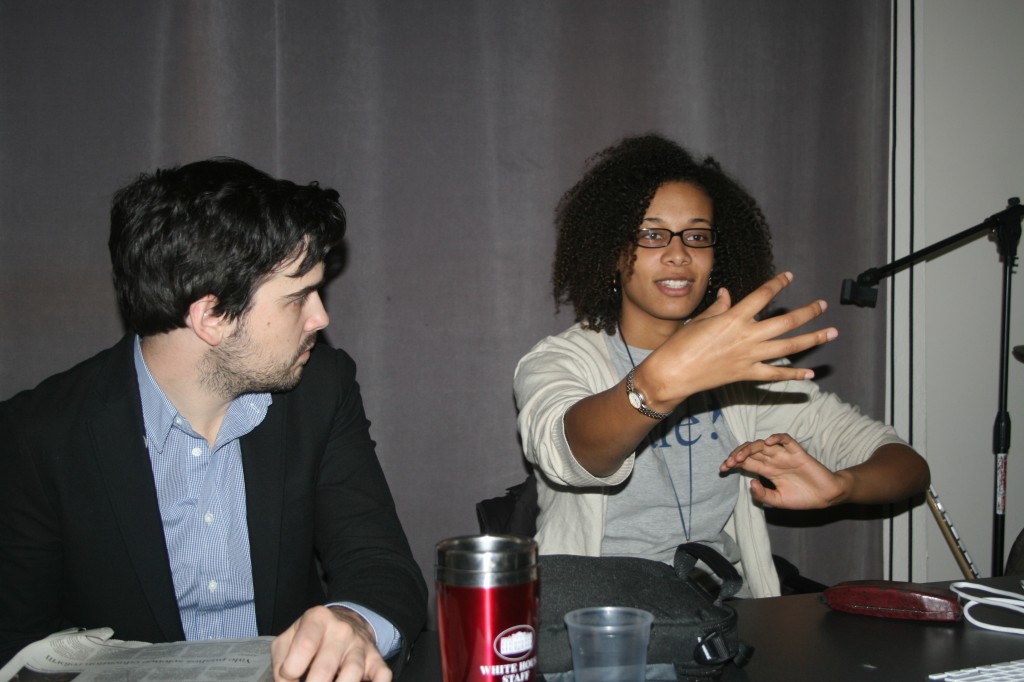 I’m trying to reform. Here’s a shot I took of Takuya in action.
I’m trying to reform. Here’s a shot I took of Takuya in action.
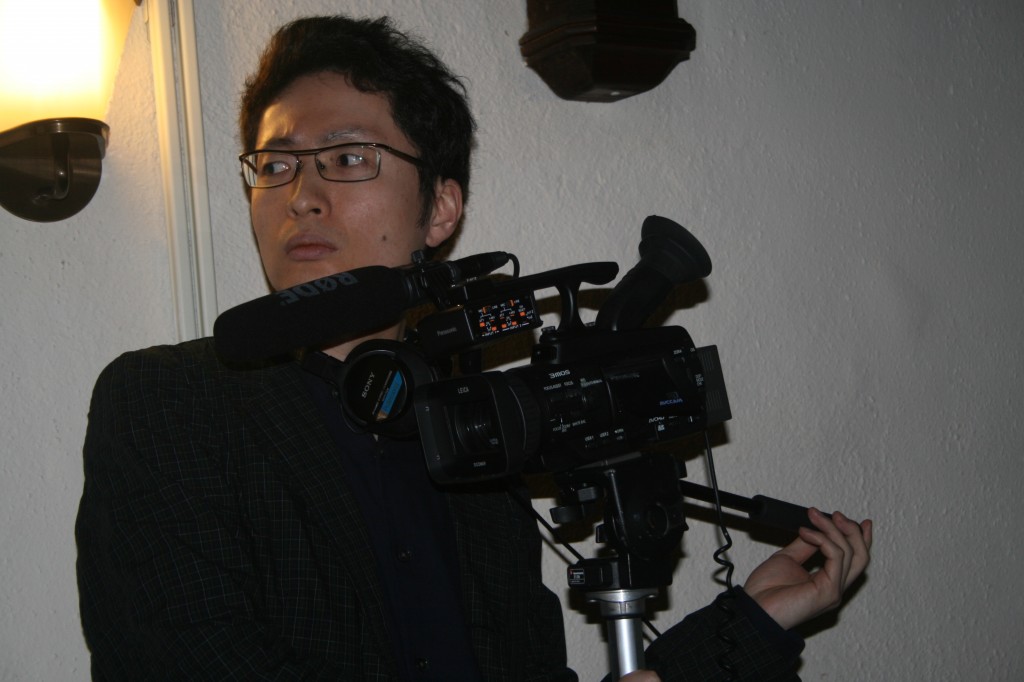 And when Lauren Tilton’s cameraman did not show up for a shoot, I became her gofer. She was filming Alan Trachtenberg, author of Reading American Photographs: Images as History, Mathew Brady to Walker Evans. I brought along my trusty Canon and snapped a few after the interview was over.
And when Lauren Tilton’s cameraman did not show up for a shoot, I became her gofer. She was filming Alan Trachtenberg, author of Reading American Photographs: Images as History, Mathew Brady to Walker Evans. I brought along my trusty Canon and snapped a few after the interview was over.
We have a few other classmates, I should mention as well.
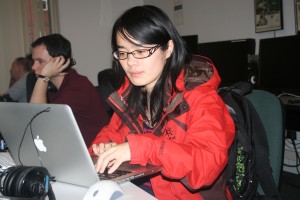 Tiffany Ruosi Wang is getting a Master’s in the School of Public Health, coming to Yale via Peking University. She came to the workshop with almost no filmmaking experience but a fierce determination to start making documentaries. She also came with an interesting idea for a project: the decision––often a real dilemma–– that Chinese students face as they approach graduation––to remain in the US or return to China. She is not in the classroom very often this semester since she has a required course that meets at the same time as our workshop. So we tend to meet tutorial fashion–or at Tuesday evening screenings.
Tiffany Ruosi Wang is getting a Master’s in the School of Public Health, coming to Yale via Peking University. She came to the workshop with almost no filmmaking experience but a fierce determination to start making documentaries. She also came with an interesting idea for a project: the decision––often a real dilemma–– that Chinese students face as they approach graduation––to remain in the US or return to China. She is not in the classroom very often this semester since she has a required course that meets at the same time as our workshop. So we tend to meet tutorial fashion–or at Tuesday evening screenings.
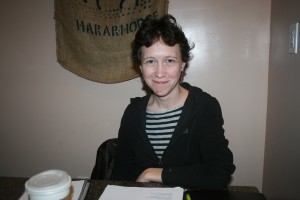 Janett Buell is a third year Ph.D. student in German and Film Studies. Last year she took my critical studies course Digital Documentary and the Internet and was won over to documentary as a field of interest. Thus her wish to make one (understanding this mode of filmmaking from the inside). Janett has been a theory head and so her novel but quite brilliant choice of a subject: the color “grey” –or is it “gray”? And is it a color? I can’t reveal any more, but this is only the beginning of her multi-faceted approach to this subject. Headed into the spring semester, Janett found herself preoccupied with orals (plus teaching), and so she has taken a one semester sabbatical from the class, returning in the fall. I took this photo in a coffee shop while we met to discuss her orals: the papers in front of Janet are some of the relevant lists of books and films she needs to read and view.
Janett Buell is a third year Ph.D. student in German and Film Studies. Last year she took my critical studies course Digital Documentary and the Internet and was won over to documentary as a field of interest. Thus her wish to make one (understanding this mode of filmmaking from the inside). Janett has been a theory head and so her novel but quite brilliant choice of a subject: the color “grey” –or is it “gray”? And is it a color? I can’t reveal any more, but this is only the beginning of her multi-faceted approach to this subject. Headed into the spring semester, Janett found herself preoccupied with orals (plus teaching), and so she has taken a one semester sabbatical from the class, returning in the fall. I took this photo in a coffee shop while we met to discuss her orals: the papers in front of Janet are some of the relevant lists of books and films she needs to read and view.

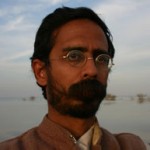
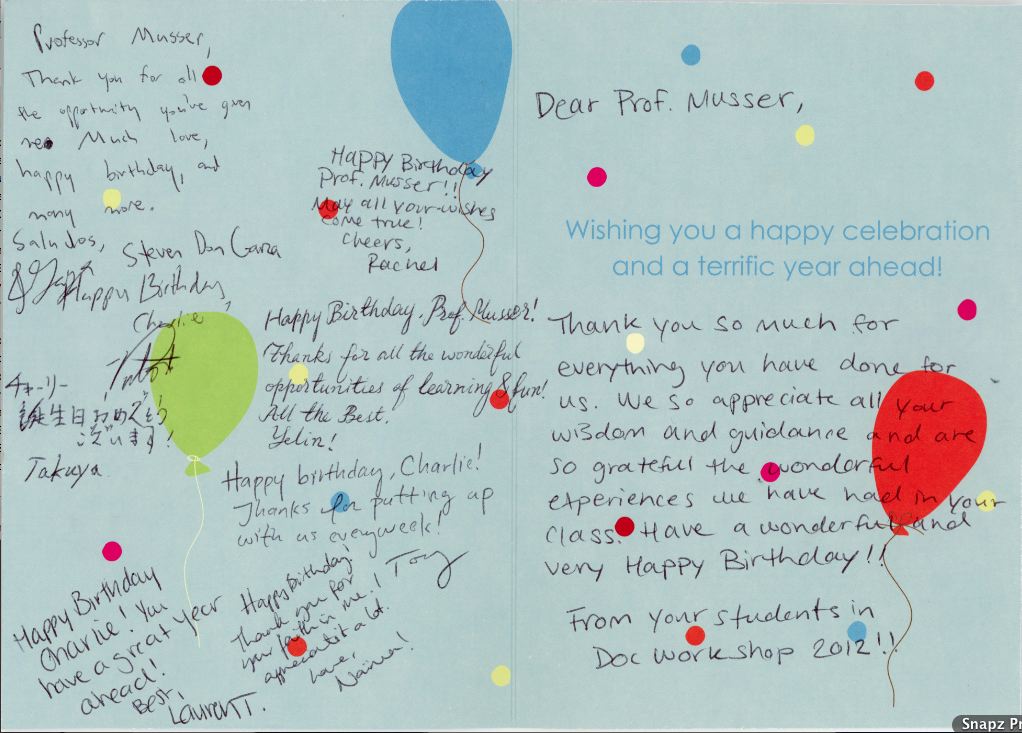
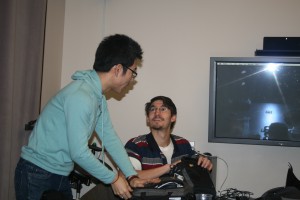
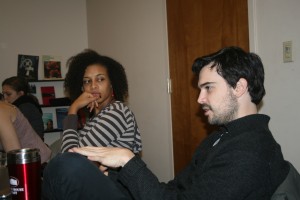
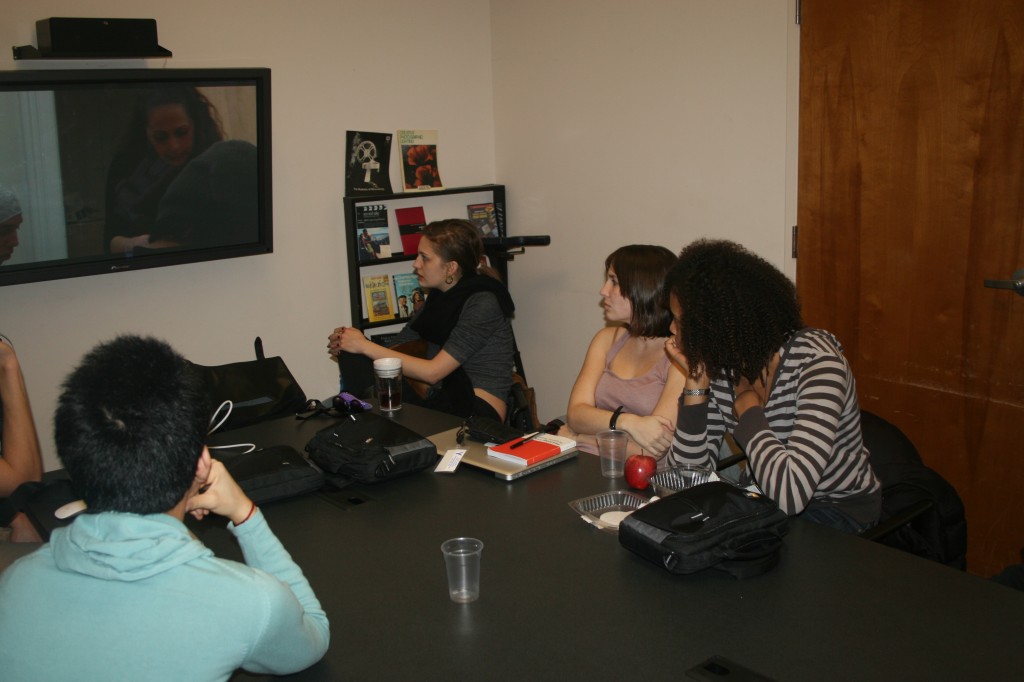
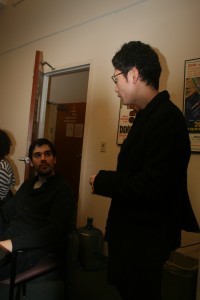
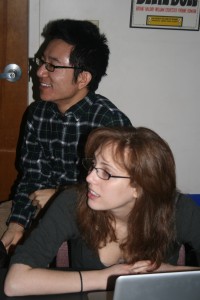
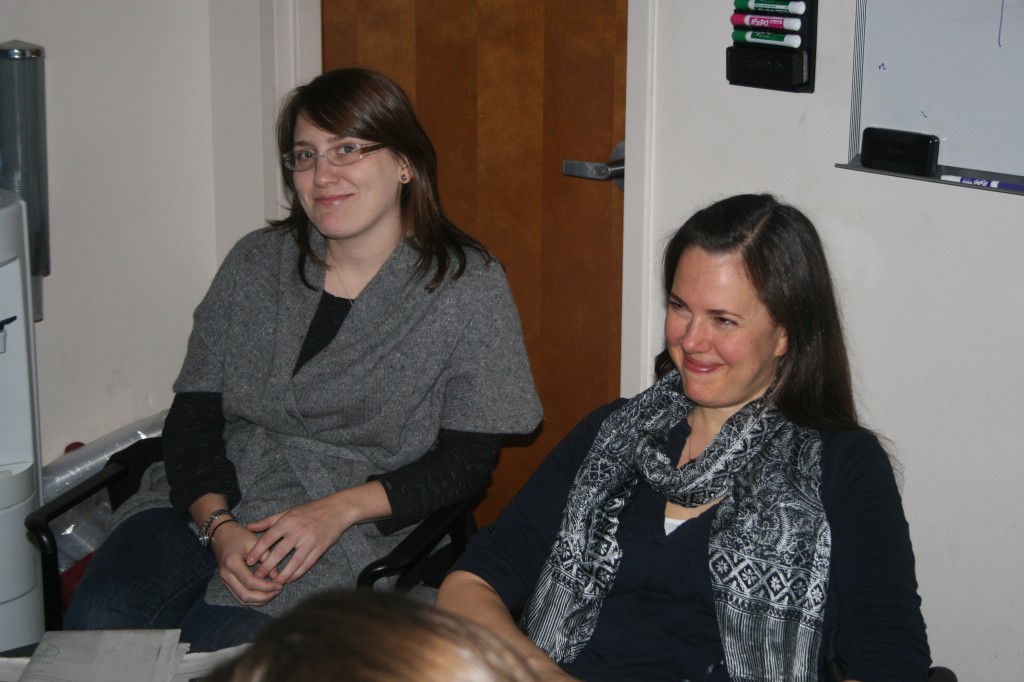
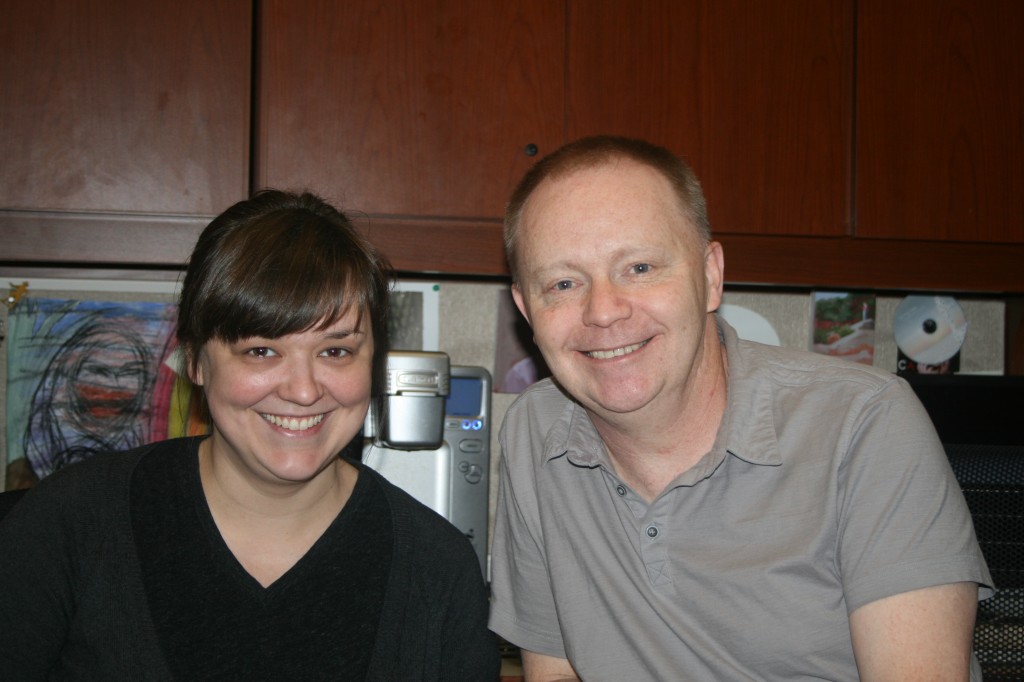
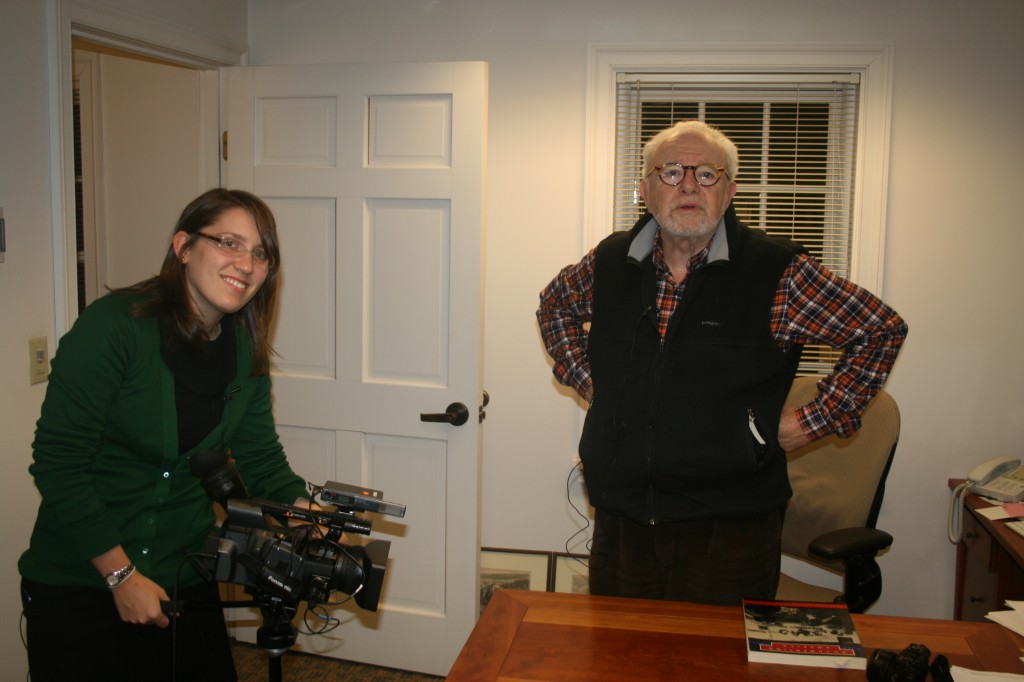
belated happy birthday, charlie.